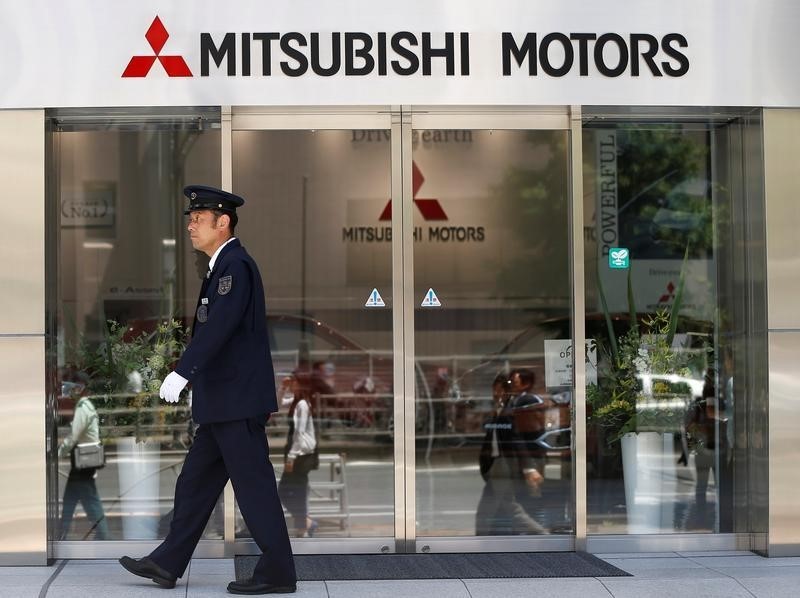By Aditi Shah and Norihiko Shirouzu
NEW DELHI/BEIJING (Reuters) - Despite years of trying, Asia's fast-growing emerging markets have proved elusive for Japan's Nissan Motor Co (T:7201), one reason behind its $2.2 billion move this week to take control of scandal-hit Mitsubishi Motors Corp (T:7211).
Nissan has invested aggressively in countries including Indonesia, deploying targeted models and beefing up distribution in Southeast Asia's largest car market. After three decades, in 2012, it revived low-cost brand Datsun.
But its market share in Indonesia is just 2.5 percent, compared with smaller rival Mitsubishi's 11 percent, in part because of a distribution network that analysts say is still insufficiently broad.
Turbo-charging its business there and in other growing economies in the region is one clear motivation for Nissan, which is pressing ahead with a plan to take a 34 percent stake in Mitsubishi Motors, even as the group tries to recover from damaging revelations over misleading fuel economy data.
"In ASEAN, (Mitsubishi) makes more than 7 percent operating margins. In 2015, we had a negative margin," Nissan Chief Executive Carlos Ghosn told analysts after the Mitsubishi deal was announced. A negative gross profit margin means Nissan is losing money on each sale.
"Their position of strength is our position of weakness. In ASEAN, they can support us a lot," he said.
Boosting their presence in emerging markets is critical for global automakers, but even more so for Nissan, overpowered by Toyota (T:7203) and its sister brand Daihatsu in Indonesia and by Suzuki in India, for example, where Suzuki accounts for one in every two cars sold.
Mitsubishi, meanwhile, has a more established name in Southeast Asia, where it has a long history producing and marketing trucks.
Sharing manufacturing plants, suppliers and dealers will help bring down costs in those price-sensitive emerging automotive markets for both Nissan and Mitsubishi.
But the clincher for Nissan, analysts say, is Mitsubishi's portfolio that is dominated by SUVs, increasingly popular with the region's growing middle classes, as well as small cars favored in emerging economies.
"Overall Mitsubishi is into core segments which actually have mass market and a lot of potential is still there," said Puneet Gupta, associate director at consultant IHS Automotive.
"With Mitsubishi, Nissan will have a better foothold even in terms of small cars," he said.
SPARE PARTS
In Indonesia, a significant factor in Mitsubishi's popularity is its network of suppliers for parts and components, ensuring good availability by keeping parts simple, and sticking to basic models.
"Our customers benefit from vast availability of spare parts, many of which are non-maker-certified, generic components," Mitsubishi Motors Chief Executive Osamu Masuko told Reuters last year.
"Most consumers don't mind that because you can buy those parts anywhere in Indonesia and keep your cars in operation without disruptions."
Mitsubishi does not sanction use of components not certified by the company for maintenance and repair, Masuko said.
Mitsubishi said last year it would build a new parts purchasing department and a new assembly plant near Jakarta and has said it plans to export vehicles from this factory to other markets in Southeast Asia and beyond. Production begins in 2017.
"They have, in our opinion, better suppliers than us. We can take some of the parts," Ghosn said on Thursday.
Nissan's previous attempt to woo buyers in emerging markets like Russia, South Africa, Indonesia and India by resurrecting the Datsun and a $3,000 model has had little success.
India, where annual car sales are growing at their fastest pace in five years, was the first country chosen for the launch. But in an effort to make the car low-cost, Nissan ended up using poor quality materials, say analysts, and the move back-fired.
Datsun sales were slow to pick up - few knew the brand and dealerships are sparse in small towns where demand for low-cost cars is highest.
Last year, Nissan's sales in the country, set to become the world's third-largest car market by 2020, fell 17 percent.
Overall, Nissan has a lead over Mitsubishi in India, but the cars it sells are limited to the low-cost and mid-income segments. The most expensive car Nissan sells in India is the Terrano SUV, priced starting at 1 million rupees ($15,000).
By contrast, the minimum price of Mitsubishi's Pajero SUV in India is 2.65 million rupees.

In India, Nissan would benefit from tapping Mitsubishi's premium customers, whereas Mitsubishi can take advantage of Nissan's economies of scale with suppliers.